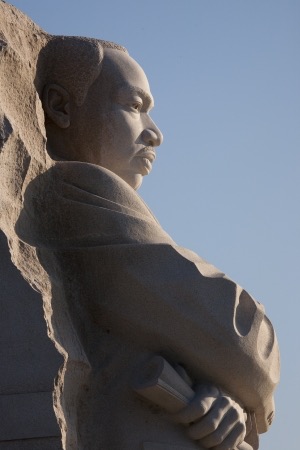
Dr. Martin Luther King recited from “We Shall Overcome” in his final sermon in Memphis on Sunday, March 31, 1968.
On Monday, November 21st, a judge in the U.S. District Court for the Southern District of New York (S.D.N.Y.) issued a decision allowing a copyright case involving the well-known spiritual song and 20th century civil rights anthem We Shall Overcome to go forward. At the center of this case is the question of whether or not We Shall Overcome is part of the public domain in the United States, and the recent decision by S.D.N.Y. Judge Denise Cote indicates that the song could in fact be public domain material. “Resolution of the issues of originality and ownership will require discovery and a more developed record,” Cote’s decision reads.
This action comes after the lawsuit was first filed this April by the We Shall Overcome Foundation against the Richmond Organization, who licenses the use of We Shall Overcome in films and claims to own a federal copyright to the material. The suit was brought after the We Shall Overcome Foundation, which was looking to use a copy of We Shall Overcome during a scene of a documentary it had been producing, was repeatedly rebuffed by the Richmond Organization who refused to license the song for use in the documentary. Without a synchronization license, the documentary producers could face statutory damages of up to $150,000 and so hasn’t been able to complete production of the documentary.
To challenge the exclusive copyright held by the Richmond Organization, the plaintiff argues that the song lacks originality, having had a performance history going back decades before any copyright was registered on the material. Although the defendants own a copyright dating back to 1960, the song itself is based on an African-American spiritual with the same melody and similar lyrics, which first came into popular usage in the late 19th century or early 20th century. Not much later than that, the song became an important symbol in the early 20th century labor movement.
Indeed, according to Wikipedia, We Shall Overcome is lyrically descended from a hymn titled I’ll Overcome Someday by Charles Albert Tindley, was first published in 1900.
Although the Richmond Organization scored a victory in the recent S.D.N.Y. decision, which dismissed all state law claims against the company, plaintiff’s Copyright Act claims will continue to go forward in the case. Judge Cote found that the We Shall Overcome Foundation had plausibly argued that the first verse of the copyrighted version of the song lacked originality, as it only differed by three words from a non-copyrighted version authored in 1948 by the FTA-CIO Workers Highlander Students. The defendants also brought forth written records from Pete Seeger, who was listed as an author in a copyright registration for the song, where he allegedly admits that he is unaware of who is responsible for changes in word choice leading up to copyright registration. S.D.N.Y. was not swayed by defendants’ arguments to dismiss the claims on the song’s originality. “Whether the Plaintiffs will prevail awaits a decision through summary judgment or at trial,” the recent S.D.N.Y. decision reads.

![[IPWatchdog Logo]](https://ipwatchdog.com/wp-content/themes/IPWatchdog%20-%202023/assets/images/temp/logo-small@2x.png)

![[Advertisement]](https://ipwatchdog.com/wp-content/uploads/2024/04/Artificial-Intelligence-2024-REPLAY-sidebar-700x500-corrected.jpg)
![[Advertisement]](https://ipwatchdog.com/wp-content/uploads/2024/04/UnitedLex-May-2-2024-sidebar-700x500-1.jpg)
![[Advertisement]](https://ipwatchdog.com/wp-content/uploads/2024/04/Patent-Litigation-Masters-2024-sidebar-700x500-1.jpg)

![[Advertisement]](https://ipwatchdog.com/wp-content/uploads/2021/12/WEBINAR-336-x-280-px.png)
![[Advertisement]](https://ipwatchdog.com/wp-content/uploads/2021/12/2021-Patent-Practice-on-Demand-recorded-Feb-2021-336-x-280.jpg)
![[Advertisement]](https://ipwatchdog.com/wp-content/uploads/2021/12/Ad-4-The-Invent-Patent-System™.png)






Join the Discussion
No comments yet.